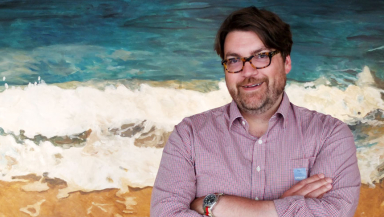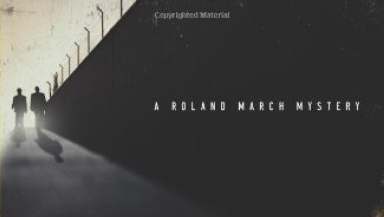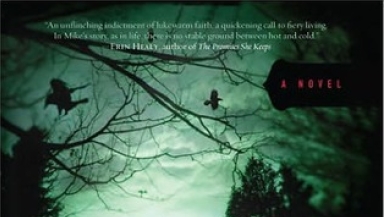Back in February, Christian Today asked the question "What's wrong with Christian fiction?" Why is it so often viewed as second rate? Why does it feel like we peaked at Lewis and Tolkien a sorry half century ago?
As J Mark Bertrand, critically acclaimed author of the Roland March crime trilogy, commented in our last article on this, "The Christian publishing world has embraced the safe over the good."
Stories with compelling drama, convincing heroism and well-crafted, true-to-life characters are often dismissed by Christian publishers because of things like swearing, violence or overtly sexual references.

Grace Bridges, a New Zealand-based writer and editor of Christian science fiction tells me that one publisher of Christian romantic novels, Steeple Hill, had a list of words and phrases that were not allowed to be used by prospective authors. The extensive list included words as innocuous as 'bra', 'golly', 'Halloween', and 'passion'. Other words to get the chop were 'arousal', 'butt' or 'buttock', 'damn', 'breast', 'hot' and not surprisingly, 'sex'. Swear words were a given but even the word 'swear' was not allowed.
I have seen this list around various blog sites but it was nowhere to be seen on Steeple Hills' own website and the publisher did not respond to my enquiry when I tried to verify its existence with them.
Bridges asserts that while the list may have gone from the website, the censorship remains in practice.
Publishers are not making these decisions in a vacuum. The market is pushing them in this direction.
In 2012, Christian speculative fiction publishers Marcher Lord Press moved forward with an experimental, more 'mature' imprint called Hinterlands. To make it clear what the imprint would include, the following declaration was attached to the announcement:
"Hinterlands books may contain vulgarity, profanity, nudity, and/or sexual content, but never for gratuitous purposes. Hinterlands allows us to pursue crossover publishing that will put the word of the gospel before people who would never otherwise pick up a Christian novel.
"It also allows us to examine mature themes in a realistic manner that some Christians will appreciate. We know that not everyone will want to read these books, so we have set them apart into the Hinterlands imprint."

The first novel was a fantasy series in a similar vein to George R R Martin's "A Song of Ice and Fire" series, which includes such well known titles as "Game of Thrones".
Unoriginal title aside, when "A Throne of Bones" was released some of the criticism from Christians had little to do with the book's merit as a piece of writing. One online reviewer on Amazon who gave it one star said the following:
"Knowing that Mr. Day was a Christian, and he compared his work to JRR Tolkein [sic] and CS Lewis, I was looking forward to reading it. I was sorely disappointed to find profanity, and vulgarity and a few other things I found objectionable. If you are into Christian fiction, this is not the book for you."
A comment left on the Hinterlands Facebook page read:
"Can I just ask you to please be careful about all of this? Remember the verses in Philippians 4-8 and 9 - would Jesus or Paul really go there? Will it be causing someone to stumble? Just something to think about."
The reviewers' perspective is not untypical and therein lies the problem - the unwillingness of many Christians to read anything "objectionable".
"A story with no naughty bits in may be accepted ahead of a story that may be better written and more brilliantly beautiful, but might have a couple more gritty things in it that Christians don't want to see in their fiction," says Bridges.
It is of course right to ask about whether we cause people to stumble with our actions and our words. That makes sense. But if fiction contains more realistic representations of the world, that's because these things actually exist in the world. If we can't even deal with fictional representations how can we deal with the reality?
Such an attitude comes at least in part from a poor reading of the Bible. Jesus spent much of his time engaging with and speaking into the darker sides of life - prostitutes, the demon-possessed, the ill and rejected.
As Christian fiction author Shaun Lambert points out: "As Christians we should be, in some sense, un-shockable. Jesus talked to all the people that everyone else avoided. He needs to be our example there."
Christian speculative fiction author Mike Duran believes there is an unwillingness in the Church to face up to some of the ambiguities in the Bible when it comes to things like suffering or difficulty.
"Think about the book of Job, possibly the oldest book in the bible. There's all these horrible things that happen to Job, and at the end there's no resolution. I mean yes, he gets all his things back, but there's no resolution," he says.
"God answers by asking questions of Job. 'Where were you when I laid the foundations of the Earth?' What fascinates me about that is the ambiguity of it."

He reckons this ambiguity is the exact opposite of what the Christian fiction market wants: "We expect message driven fiction that will walk us through the gospel with a pretty neat resolution with little ambiguity."
Ambiguity and a world that doesn't have clean pigeon holes of the purely evil person or the wholly good is closer to reality and the human condition that the Bible describes, yet it is something Christian fiction shies away from.
Bertrand believes we're not just failing to write good fiction, we're actually missing the point of the Christian message.
"There is a sentimentalism in Christian culture, there's a definitive division between good and bad guys, and there is a simple way of making these separations. When you deal with a theological tradition dealing with the fallenness of humanity, you realise there are no white hatted good guys. The only means to fight evil are often evil themselves.
Bridges draws similar conclusions: "It's a picture of the bubble that the church is, the enclave of unwillingness to deal with these things."
Expressing frustration at the lack of crime fiction in the Christian market, Bertrand says the crime genre "fits perfectly with Christian theology, but not the Christian evangelical mindset".
"In noir fiction, they accept that there are no white hatted good guys. We all have this potential to be seduced and corrupted. I can't explain why that topic doesn't interest the evangelical reader."
This failure to embrace ambiguity is a topic that concerns Ian Metcalfe, director of publishing at the UK based Hodder Faith.
"One of the defining features of evangelical Christianity is that we like things to make sense, to work out, to all fit together. I think that mitigates against truly great artistry in any field," he says.
This is a real problem. If Christians think they have all the answers and understand everything that is needed to be understood, art as a means of expression becomes more like a science, seeking to express something eminently knowable. There is nothing left to explore and when we apply that to Christian fiction, it is like saying that there is nothing about that intersection between faith, God and our real lives in this real world that needs to be explored.
What would be more stimulating and challenging would be to use art to probe deeper into what it means to be a Christian and what the true nature of God is. The premise then becomes accepting that God is someone who we cannot understand fully and that we haven't got all of our faith and life sussed out.
"The evangelical drive to know the answers and not to let fear and confusion in strangles our fiction," says Metcalfe.
"The best fiction helps us grapple with the issues that we can't deal with. Can we think differently about God and still deal with these same issues?"
It's this desire for everything to make clear sense and for theology to come above quality in fiction, that drives many authors away from Christian fiction. Most notably, this affects the speculative fiction area.

Duran tells the problems he encountered when he included a ghost in his book.
"The first book I published, I had a ghost in there. Ghosts are not welcome in Christian fiction because evangelicals often see ghosts as demons. It had a lot of rejections early on because Christians have a lot of problems with ghosts.
"When it was published, I was asked to write an afterword explaining my understanding of the possibility of ghosts. Speculative fiction challenges a whole bunch of theological concepts, very sticky for lots of Christian publishers.
"That's why fantasists and speculative writers look badly on the Christian market. They don't want to jump through all the theological hoops just to tell a story. If the guy's a wizard, he's a wizard, why do I need to have theological explanation for where his power's coming from?"
Perhaps the biggest problem facing the Christian publishing industry, however, is the commercialism inherent to it. As mentioned earlier, Christian publishers don't exist in a vacuum. If the market encourages them to make the romances and Amish fiction we talked about in "What's wrong with Christian fiction?", that's what they will make. If lots of people buy them, why change?
But the key factor here is that these are 'Christian' publishers. While they are a business, that should not be their first identity. Their first identity should be as a ministry sharing the kingdom of God with others, and it is clear that the bland flavour of large swathes of present Christian fiction isn't doing that.
Too many Christian publishers are looking at a commercial interest of selling to their market ahead of representing Christianity to the literary world. Representing Christianity should mean the best possible books, with the best possible stories, because we believe that at their heart is our God who is the best there possibly is.
But as Bertrand points out, there's a reason why the commercial desire of publishers is not being spoken out against more.

"Commercialisation within the Church has helped to facilitate this compartmentalisation. When you go to your super mega church and you see your celebrity pastor, are you getting a lot of pushback against this commercial bias?
"The Church doesn't speak a different truth into your business at that point. None of the problems of this commercialisation are unique to the publisher.
"If you have this argument in a group of Christian publishers, you'll get passionate defenders of the status quo. They can't deal with any criticism."
Ultimately, a good story is the most important thing a Christian writer should be concerned with. As fiction editor Chila Woychik points out, "When we read touching, deep, beautiful, emotive, strong, literary stories written by non-evangelicals, we should learn from them, not avoid them because they're not Christian stories."
If we want to evangelise with fiction, we're not going to succeed by writing about a world that is unrecognisable as the real one. Nor are we going to evangelise by simply re-packaging the Gospel into a fiction narrative.
The best Christian fiction is the story where the characters deal with the real world as a Christian deals with it. That means there is going to be ambiguity, because there's ambiguity in real life. There's going to be unanswered questions, because that's what we face in real life.
And there is going to be swearing, drinking, sex and, shockingly, undergarments in some of these stories. Surprising as it may be to some, these are all real things in this real fallen world and if we write stories about cleaner worlds, the wider world will think we are in denial, because we are.
As Christian science fiction writer Simon Morden puts it: "We need to be concerned with specific Christian characters that are recognisably Christian within a real world setting."













